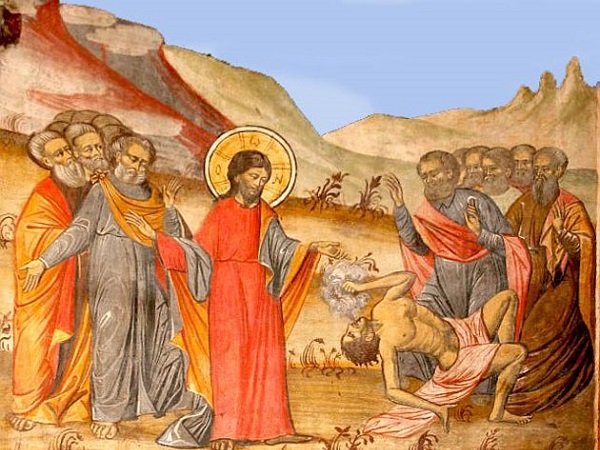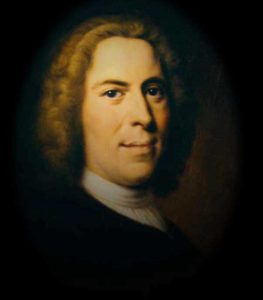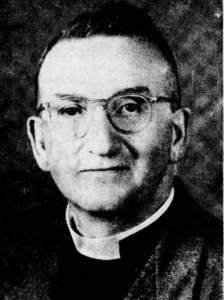Jesus rebuking the unclean spirit
Mount Calvary Church
Eutaw Street and Madison Avenue
Baltimore, Maryland
A Parish of the Roman Catholic Personal Ordinariate of St. Peter
Anglican Use
Rev. Albert Scharbach, Pastor
Septuagesima
8:00 AM Said Mass
10:00 AM Sung Mass
Prelude
Herr Christ, der einig Gottes Sohn, J.W. Walther
Hymns
O, for a heart to praise my God
Jesus, lead the way
Songs of thankfulness and praise
Anthems
How beautiful are the feet of them, G. F. Handel
Ave Maria, Robert Parsons
Postlude
Allein Gott in der Höh sei Ehr, J.G. Walther
_____________________________________
Prelude
Herr Christ, der einig Gottes Sohn, J.W. Walther
Hymns
O, for a heart to praise my God
O for a heart to praise my God is by Charles Wesley (1707-1788). This hymn has the Wesleyan emphasis on the religion of the heart, which is transformed by the saving blood of Jesus. The hope for perfection is deeply Wesleyan. The Beatitudes likewise point the Christian to greater and greater perfection: Blessed are the pure of heart, blessed are the meek. Perfection is found in love, because we become sharers of the divine nature, and Jesus reveals the “new, best name” of God, Love.
1 O for a heart to praise my God,
a heart from sin set free;
a heart that’s sprinkled with the blood
so freely shed for me:2 A heart resigned, submissive, meek,
my great Redeemer’s throne;
where only Christ is heard to speak,
where Jesus reigns alone:3 A humble, lowly, contrite heart,
believing, true, and clean,
which neither life nor death can part
from Him that dwells within:4 A heart in every thought renewed,
and full of love divine;
perfect and right and pure and good —
a copy, Lord, of Thine.5 Thy nature, gracious Lord, impart,
come quickly from above;
write Thy new name upon my heart,
Thy new best name of Love.
Protestants, following Luther, tended to think that man was simul justus et peccator, at the same time just and a sinner. Luther used the Ten Commandments in his catechesis, but he thought the purpose of the Law was to show us that we were unable to obey it, and that we had to receive the unearned forgiveness of God. (He did not tell children that they were unable to obey the Commandments!) But Wesley thought that, with the help of the Holy Spirit, the heart, the emotions, the deep well of our being, could be “strangely warmed” and that we could therefore attain to sinless perfection in this life. Jesus in the Beatitudes calls us to a high perfection, and above that perfection are the gifts of the Holy Spirit which supernaturalize human nature and help us to attain to participation in the divine nature, to divinization (theosis).
__________________________
Jesus, lead the way
Jesus, lead the way is a translation by the Episcopal clergyman Arthur W. Fandlander of the German hymn Jesu, geh’ voran, written by Nicolas Ludwig, Graf von Zinzendorf. It is a simple prayer for help in the difficulties and pains of life, and a reminder that the way of the cross leads home to God.
Nicolas Ludwig, Graf von Zinzendorf
The tune SEELENBRÄUTIGAM (The Bridegroom of the soul) is by Adam Drese (1620—1701). In 1697 he wrote Seelenbräutigam, Jesus, Gottes lamm. In 1721 Von Zinzendorf wrote Seelenbräutigam, o du Gottes Lamm, and set it to Drese’s melody, thereby leading to a confusion between the two hymns. Von Zinzendorf later wrote Jesu, geh voran, which is set to Drese’s tune, and it is a translation of this hymn that we use in the 1940 Hymnal.
Arthur William Farlander
The version in the 1940 Hymnal is the translation by Arthur William Farlander (1898—1952). Farlander was born in Germany. Sometime in his early life he moved to the United States and was confirmed as an Episcopalian in the 1920s. He was ordained in 1927. He was rector of a church in San Francisco, dean of St James Cathedral in Fresno, and later rector of churches in Santa Clara and Santa Rosa. He was on the twenty-four member committee which produced the 1940 Hymnal for which he helped translate six texts. He was a pioneer in Episcopal radio ministry.
Drese was at first musician at the court of Duke Wilhelm, of Sachse-Weimar; and after being sent by the Duke for further training under Marco Sacchi at Warsaw, was appointed his Kapellmeister in 1655. On the Duke’s death in 1662, his son, Duke Bernhard, took Drese with him to Jena, appointed him his secretary, and, in 1672, Town Mayor. After Duke Bernhard’s death, in 1678, Drese remained in Jena till 1683, when he was appointed Kapellmeister at Arnstadt to Prince Anton Günther of Schwarzburg-Sondershausen, who required Drese to put aside secular music and concentrate on Pietist compositions. He died at Arnstadt shortly before J. S. Bach came there.
Jesus, led the way
Through our life’s long long day,
And with faithful footsteps steady,
We will follow, ever ready;
Guide us by Thy hand
To our fatherland.
Should our lot be hard,
Keep us on our guard;
Even through severest trial
Make us brave in self-denial
Transient pain may be,
But a way to Thee.When we need relief,
From an inner grief,
Or when evils come alluring
Make us patient and enduring:
Let us follow still
Thy most holy will.Order thou our ways,
When we need relief,
From an inner grief,
Or when evils come alluring
Make us patient and enduring:
Let us follow still
Thy most holy will.Saviour, all our days:
Order thou our ways,
When we need relief,
From an inner grief,
Or when evils come alluring
Make us patient and enduring:
Let us follow still
Thy most holy will.
Here, with a somewhat different translation, is a choral arrangement
Von Zinzendorf’s hymn:
Jesus, geh voran
auf der Lebensbahn;
und wir wollen nicht verweilen,
Dir getreulich nachzueilen,
führ uns an der Hand
bis ins Vaterland.Soll’s uns hart ergehn
laß uns feste stehn,
und auch in den schwersten Tagen
niemals über Lasten klagen;
denn durch Trübsal hier
geht der Weg zu Dir.Rühret eigner Schmerz
irgend unser Herz,
kümmert uns ein fremdes Leiden:
O so gib Geduld zu beiden.
Richte unsern Sinn
auf Dein Kommen hin.Ordne unsern Gang,
Jesus, Leben slang.
durch rauhe Wege,
gib uns auch die nöt’ge Pflege.
Tu uns nach dem Lauf
Deine Türe auf.
Here is Bach’s 1697 arrangement of Jesu, geh voran, using Drese’s tune and words..
J.S. Bach in 1736 used Drese’s Seelenbraatigam, Jesus Gottes lamm as the basis for his cantata of that name (BWV 496). Here is a version and also the beginning.
And here is the complete text:
Seelenbräutigam,
Jesu, Gotteslamm!
habe Dank für deine Liebe,
die mich zieht aus reinem Triebe
von dem Sündenschlamm,
Jesu, Gotteslamm.Deine Liebesglut
Licht stärket Mut und Blut,
wend nu freundlich mich anblickest
und an deine Brust mich drückest,
macht mich wohlgemut
deine Liebesglut.Wahrer Mensch und Gott,
Tost in Not und Tod,
du bist darum Mensch geboren,
zu ersetzen, was verloren,
durch dein Blut so rot,
wahrer Mensch und Gott.Meines Glaubens Licht
lass verlöschen nicht,
salbe mich mit Freudenöle,
dass hinfort in meiner Seele
ja verlösche nicht
deine Liebesglut.So werd ich in dir
bleiben für und für,
deine Liebe will ich ehren
und in dir dein Lob vermehren,
weil ich für und für
bleiben werd in dir.Held aus Davids Stamm,
deine Liebesflamm
mich ernähre, und verwehre,
dass die Welt mich nicht versehre,
ob sie mir gleich gram,
Held aus Davids Stamm.Großer Friedensfürst,
wie hast du gedürst
nach der Menschen Heil und Leben
und dich in den Tod gegeben,
da du riefst: Mich dürst’,
großer Friedensfürst.Deinen Frieden gib
aus so reiner Lieb,
uns, den Deinen, die dich kennen
und nach dir sich Christen nennen,
denen bist du lieb,
deinen Frieden gib.Wer der Welt abstirbt,
emsig sich bewirbt
um den lebendigen Glauben,
der wird bald empfind1ich schauen,
dass niemand verdirbt,
wer der Welt abstirbt.Nun ergreif ich dich,
ach! ergreife mich!
ich will nimmermehr dich lassen,
sondern gläubig dich umfassen,
weil im Glauben ich
nun ergreife dich.
Wenn ich weinen muss,
wird dein Tränenfluss
nun die meinen auch begleiten
und zu deinen Wunden leiten,
dass mein Tränenfluss
sich bald stillen muss.Wenn ich mich aufs neu
wiederum erfreu,
freuest du dich auch zugleiche,
bis ich dort in deinem Reiche
ewiglich aufs neu
mich mit dir erfreu.Hier durch Spott und Hohn,
dort die Ehrenkron;
hier im Hoffen und im Glauben,
dort im Haben und im Schauen;
denn die Ehrenkron
folgt auf Spott und Hohn.Jesu, hilf, dass ich
allhier ritterlich
alles durch dich überwinde
und in deinem Sieg empfinde,
wie so ritterlich
du gekämpft für mich.Du mein Preis und Ruhm,
werte Saronsblum,
in mir soll nun nichts erschallen
als was dir nur kann gefallen,
werte Saronsblum,
du mein Preis und Ruhm.
Schleiermacher also wrote a short hymn for this melody: Dienen Frieden gieb.
__________________________________
Songs of thankfulness and praise
Songs of Thankfulness and Praise was written by Christopher Wordsworth. He described it as “recapitulation of the successive manifestations of Christ, which have already been presented in the services of the former weeks throughout the season of Epiphany; and anticipation of that future great and glorious Epiphany, at which Christ will be manifest to all, when he will appear again to judge the world.” Through his miracles, his acts, Jesus manifests his nature, and gives us a foretaste of the time when he will finally reveal himself and come to heal the world of all evil, all sickness, and of death itself.
1. Songs of thankfulness and praise,
Jesus, Lord, to Thee we raise,
Manifested by the star
To the sages from afar;
Branch of royal David’s stem
In Thy birth at Bethlehem;
Anthems be to Thee addressed,
God in man made manifest.2. Manifest at Jordan’s stream,
Prophet, Priest, and King supreme,
And at Cana, Wedding-guest,
In Thy Godhead manifest;
Manifest in power divine,
Changing water into wine.
Anthems be to Thee addressed
God in man made manifest.3. Manifest in making whole
Palsied limbs and fainting soul;
Manifest in valiant fight,
Quelling all the devil’s might;
Manifest in gracious will,
Ever bringing good from ill.
Anthems be to Thee addressed,
God in man made manifest.4. Sun and moon shall darkened be,
Stars shall fall, the heavens shall flee;
Christ will then like lightning shine,
All will see His glorious sign;
All will then the trumpet hear,
All will see the Judge appear;
Thou by all wilt be confessed,
God in man made manifest.5. Grant us grace to see Thee, Lord,
Mirrored in Thy holy Word;
May we imitate Thee now
And be pure as pure art Thou
That we like to Thee may be
At Thy great Epiphany
And may praise Thee, ever blest,
God in man made manifest.
Here is St John’s. Detroit.
Christopher Wordsworth
Christopher Wordsworth (1807-1885) was the nephew of the poet William Wordsworth. Christopher Wordsworth was an athlete, classicist, poet, and Anglican bishop of Lincoln, to which position he was appointed by Disraeli.
______________________________________________
Anthems
How beautiful are the feet of them, G. F. Handel
How beautiful are the feet of them that preach the gospel of peace and bring glad tidings of good things.
Ave Maria, Robert Parsons
Ave Maria, gratia plena, Dominus tecum. Benedicta tu in mulieribus et benedictus fructus ventris tui Jesus.
Robert Parsons was composing during a period of major religious upheaval in England. After the death of Henry VIII in 1547, the new King Edward VI advanced the Reformation in England, introducing major changes to the liturgy of the Church of England. In 1549, Thomas Cranmer’s new Book of Common Prayer swept away the old Latin liturgy and replaced it with prayers in English. This brand new liturgy suddenly demanded that new music should be written for the church in English, and musicians of the Chapel Royal such as Thomas Tallis, John Sheppard, and Robert Parsons were called upon to demonstrate that the new Protestantism was no less splendid than the old Catholic religion. During the reign of Mary Tudor (1553–1558), a revival of Catholic practice encouraged a return to Latin music, but after Elizabeth I ascended to the throne of England in 1558, vernacular English liturgy and music came back into favour.
Parsons is especially noted for his choral motets, and he is recognised as a master of polyphonic writing for choirs with his skilled use of cantus firmus within his works. Notable works include his setting of the Ave Maria.
Here is St. John’s College, Cambridge. Here is the Siglo del Oro.
Postlude
Allein Gott in der Höh sei Ehr, J.G. Walther
Ronald IJmker bespeelt het koororgel van de Hervormde Kerk in Coevorden.



